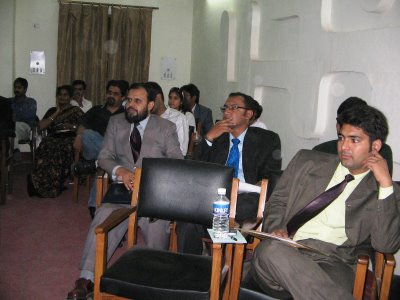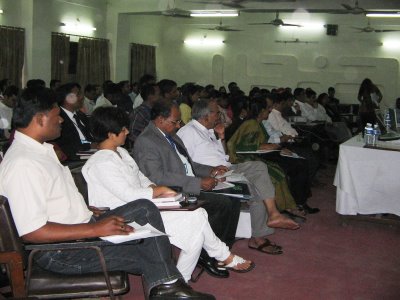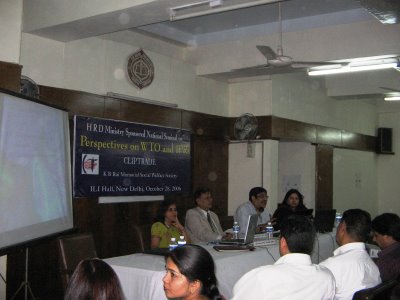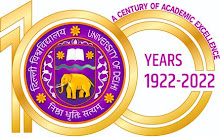Monday, December 11, 2006
Ganesha or Simply Another Suffering Animal?
Consequently, when it comes to faith and religion, we leave no stone unturned to even force feed paleolithic idols of Lord Ganesha, but give the living symbol, the Elephant, a royal ignore. How come our hearts do not move when we see these iconic Ganesha's in the Zoo's or doing a circus show, all driven by starvation or a painful ankush? Is it because faith is blind or because something is wrong with our collective vision?
Todays 'The Hindu' carries a wonderful article on Elephants. Do take time out to read the following:
http://sunanda.bharti.googlepages.com/asianelephant
Monday, November 27, 2006
New face of your Blog
Happy Reading!
Sunanda
Against DP.
My point-wise reply follows:
1.You say that social consequences would be far grave if an example
is not set at this very moment and that Law should be given an
opportunity to do some damage-control now.
A: What are these 'social consequences'? Will it lead to an increase
in the number of murders? Please look at the facts. In the State of
Travancore, there were 962 murders between 1945 and 1950 when the
d.p.was not in force; but in the five years from 1950 when it was
re-imposed, there were 967 murders. In Canada, after the abolition of
d.p.in 1976, the homicide rate declined. In 2000, there were 542
homicides in Canada - 159 fewer than in 1975. A survey released in
Sep.2000 by the NYT found that during the last 20 years, the homicide
rate in States with the d.p. had been 48 to 101 per cent higher than
in those that did not allow capial punishment. In the U.S., 500
people have been executed since the Supreme Court reinstated the
d.p.in 1976. Over the same period, 75 convicts were released after
evidence showed that they had been wrongfully convicted. (These
figures were cited in an article by Rajindar Sachar in The Hindu).
2. Is d.p. a damage-control devise by the Law? Control what damage? I
don't think it was envisaged by our law-makers as such. The latest
law is that it should be reserved for the rarest of the rare crimes,
considering the severity of the murder. But I am not on this law-point
at all, but on the ethical issues which you raised.
3. You are concerned with the message that a court order without d.p.
would give to the perpetrators of such crimes. That they can evade the
d.p. and continue to living at State's expense as a prisoner
undergoing LI.
A: Do any of us seriously believe that Santosh killed her, after
sufficiently pondering over the possibility that he could escape d.p.
because of his connections. It was a crime committed as a result of
passion, wrong parental upbringing, and not because in India, it is
possible to evade d.p. if you have right connections. If Santosh's
connections were the cause, then why Dhananjoy or any other lesser
personality would commit rape and murder?
Your argument would lead one to infer that all men are potential
rapists and killers, but they are held back, only because of d.p.
staring at their faces. Many men, in fact, are affected by the
passion, which drove Santosh to commit the crime, but they refrain
from doing so, not because of the presence or absence of d.p., but
because it makes no sense to commit such an extreme offence to satisfy
one's lust. Having said this, I would add, d.p. fails to address the
cause of Santosh's crime -which is wrong parental upbringing, which
could be the focus of a sociological inquiry (sadly no journalist has
focussed on this).
They need not live at State's expense. Their families could be asked
to meet the bill of their stay in the jail. If the families cannot
afford, I am sure there would be a number of human right NGOs, which
would come forward to meet this cost.
4. Giving another chance to criminal = risks social safety. The
debate on the Afzal case is a clear pointer that the social safety
lies in commuting d.p. as social safety in J&K, and as a result in the
rest of India, is endangered by the fallout of executing Afzal. In
other words, social safety should hardly be a consideration for
imposing d.p. How do we say that a person's death can ensure social
safety? Because we assume that he may commit similar crimes. This
probability should not be the basis for imposing d.p., because for
other forms of punishment, we rely on hard facts, not on probabilities
or likelihoods.
5. Denigrate the dignity of law? The law itself gives discretion to
the Judge whether to impose d.p. The Judge may go wrong in his
judgment whether the case is the rarest of rare or not. There is
cacaphony of differing judicial views on what constitutes rarest of
rare in the Supreme Court. So, dignity of which law? Putting the
social conscience on the wrong path? Do we believe the society
collectively will approve of rape and murder, if d.p. is not imposed
on Santosh?
6. Go a long way in disturbing the conscience of potential
perpetrators? D.P. has been in the statute books for a long time as
an option, and imposed several times, and many had been hanged. But
potential perpetrators continue, without their conscience being
disturbed. The reason is no murderer fears law, if he fears, he would
not commit the crime, if he commits, it shows he does not fear the
law.
7. Taking a principled stand against D.P. is not having an opinionated
mind-set. I have an open mind, but I want the other side to convince
me with facts, and substantiation.
Thursday, November 23, 2006
Just a passing thought...
Yesterday, I read a quote on the status of animals in India...which I thought I should share with you all...It goes like this --" I would rather be a cow in the USA--well fed but slaughtered, than be a cow in India--worshipped and starved"
Suddenly, a thought crossed my mind...the condition of women (exclude those urban elites) is much the same...Women in India are glorified and hailed as Devi's, worshipped as the Mother Goddess...and at the very first instant of adversity, branded as 'witches' and hunted as game. I find the situation amusingly ironical. Is it not?!
Wednesday, November 01, 2006
Santosh Singh's Trial: Is death sentence too harsh?
Yes, we all are delighted, now that the case has been decided favorably.
One thing that many people have been seen pondering/introspecting and arguing is whether death sentence was necessary to meet the ends of justice. I have something to say here…
True that all of us, at one point of time or the other, tend to think along these lines. Our conscience is rattled whenever we picture the dependents of Santosh, who are no doubt innocent. But then, this would always be…there would always…ALWAYS…be two sides of the same coin. So, if the verdict in Santosh Singh’s trial has some benefits, it would inevitably and invariably have some adverse aftermaths as well (the most immediate one befalling the hapless family). The former however, in my opinion, far outweigh the latter. Just because the legal and administrative machinery did not/could not deliver at the right time or in a just fashion, and because of which the culprit managed to spread his wings, does not mean that Law should not be given an opportunity to do some damage-control now…now, that things are crystal clear.
True that some innocents would suffer…but is it not true that the social consequences would be far grave if an example is not set at this very moment? What message would it give the perpetrators of such crimes?—that they can evade the death penalty and continue living at State expense as a prisoner undergoing LI? Would that not be a mockery of Law?
Reformatory exercises for culprits and convicts is good; it sounds good at least…yes, one should explore the possibility of reforming a criminal, no matter how hardened one is…but as any general rule, this too has exceptions. And, in my opinion, if giving another chance to the criminal means risking social safety or sending a wrong signal to the society or denigrating the dignity of law or putting the social conscience on the wrong path etc, I do not think that the reformative effort is worth even a try.
The verdict in Santosh Singh’s case is a very specific one. By delivering it, I do not think that the court intends to purge the society of such evils in one go…no…but there is no denying that it would go a long way in disturbing the conscience of potential perpetrators. Fear of Law is not a bad thing, especially not if it has good consequences…it does has its own unique role in reforming the society, though insidiously. And, this is what the verdict would do.
JRR Tolkein, in his famous work, Lord of the Rings says in one episode, “Many who live deserve to die and many who die deserve life…can we give it to them? No. Then, we should not be too eager to dole out death in judgment.” It is a personal favorite…a cogent argument against capital punishment, no doubt! Having a stand point is wonderful…it shows that you are not a rudderless boat or a spineless person. However, I believe that adhering to any particular mindset in the absolute is never a healthy sign…to say that death penalty is wrong always and in all circumstances tantamount to falling prey to an opiniated mindset. Sometimes, I believe, it makes more sense to have the flexibility to be able reshape and reformulate the opinion…and this case fits that category.
Monday, October 30, 2006
The National Seminar on 'Perspectives on WTO and IPR's, held at ILI on the 28th of October 2006, went very well. Here are some pics for you to enjoy! The snaps are a bit jumbled up...not in the order of progression of the Seminar.
 Ms Pratibha Singh, Sh Amarjit Singh, Prof BN Pandey and Sh BT Kaul (LC-II). The latter chaired and co-chaired respectively the concerned session.
Ms Pratibha Singh, Sh Amarjit Singh, Prof BN Pandey and Sh BT Kaul (LC-II). The latter chaired and co-chaired respectively the concerned session. Ms Anuradha Salhotra from the renowned IPR firm 'Lall Lahri and Salhotra's', a speaker at one of the sessions receiving a memento from Prof Bansal, the Director of the Seminar.
Ms Anuradha Salhotra from the renowned IPR firm 'Lall Lahri and Salhotra's', a speaker at one of the sessions receiving a memento from Prof Bansal, the Director of the Seminar. Ms Krishna Sarma, another speaker receiving a memento from Prof Bansal, the Director of the Seminar.
Ms Krishna Sarma, another speaker receiving a memento from Prof Bansal, the Director of the Seminar.
Sh Pravin Anand, an internationally renowned IPR attorney (Anand and Anand) receiving a memento from Prof Bansal, the Director of the Seminar. Also seen in the pic are Ms Pratibha Singh, Sh Amarjeet Singh, Prof BN Pandey and Sh BT Kaul.

Attentive audience...Sh Afzal Wani, Dean, Law School, GGSIP University can be seen listening with rapt attention (sitting beside the person with blue tie).

The jam packed hall...Sh Pushpa Kumar and Dr Bharioke (both lecturers in LC-I) can be seen amongst the audience

 Sh Dominic Keating, our Chief Guest for the Seminar from the Embassy of the USA amongst student volunteers.
Sh Dominic Keating, our Chief Guest for the Seminar from the Embassy of the USA amongst student volunteers.
Friday, September 29, 2006
Are we evolved enough to change our mindsets?
Whenever I hear someone mention the “Priyadarshini Mattoo case”, something irks me. Why is that we always prefer to name a case, especially rape cases, after the names of hapless victims? Why can it not be branded and publicized as the Santosh Singh’s trial/case or something like that? After all, it is the accused/culprit (though it needs to be ‘proved’ as such in this particular case) who needs to scorned at, who needs to be humiliated. And it is the offender again against whom we need to caution the society. He is the one about whom people should be enquiring for he is the potential threat. The victim is no more and her family has already suffered much…why scandalize the matter then by succumbing to the media ruse and flashing the identity of the victim and protecting that of the accused?
Think about it and you would realize how we tend to fall prey to this strange, insensitive and unjust practice popularized by the media. How many of us even remember the names of the culprits behind the Bhanwari Devi rape case, Dr Aruna Shanbaug’s rape case, Jessica Lall murder, Naina Sahni murder etc etc?? Clueless na…
Think…and if my point makes even a wee bit of sense, try being a harbinger of change.
On a lighter note, let me take this opportunity to inform you that those who want justice for Priyadarshini can have their say by visiting her blog: http://www.ourpriyadarshini.org/blog/. Alternatively, you may look at the “Justice for Priyadarshini” button on this blog, click on it and follow the directions. You are required to sign an online petition. And wait before you give me that “Oh not that!”look…
Often do I used to wonder whether signing online petitions etc would result in something positive and fruitful at all, whether it would turn the wheels of justice…I was cynical and apprehensive. But then, it dawned upon me that SOMETHING HAS TO BE DONE…and the karmic mantra is as simple as that! Now, whenever those doubts resurface I remind myself of two things:
1) this, (that is, to support a genuine cause) is the least that we can do; busy as we are with our hectic routines and selfish businesses of life. Somehow, to me, it gives tremendous relief just to be a part of something good, no matter the part you play is miniscule and measly.
2) yes, nothing might result from it...but something may. So, lets hang on to that thread of hope and keep the faith.
Are we evolved enough to change our mindsets?
Whenever I hear someone mention the “Priyadarshini Mattoo case”, something irks me. Why is that we always prefer to name a case, especially rape cases, after the names of hapless victims? Why can it not be branded and publicized as the Santosh Singh’s trial/case or something like that? After all, it is the accused/culprit (though it needs to be ‘proved’ as such in this particular case) who needs to scorned at, who needs to be humiliated. And it is the offender again against whom we need to caution the society. He is the one about whom people should be enquiring for he is the potential threat. The victim is no more and her family has already suffered much…why scandalize the matter then by succumbing to the media ruse and flashing the identity of the victim and protecting that of the accused?
Think about it and you would realize how we tend to fall prey to this strange, insensitive and unjust practice popularized by the media. How many of us even remember the names of the culprits behind the Bhanwari Devi rape case, Dr Aruna Shanbaug’s rape case, Jessica Lall murder, Naina Sahni murder etc etc?? Clueless na…
Think…and if my point makes even a wee bit of sense, try being a harbinger of change.
On a lighter note, let me take this opportunity to inform you that those who want justice for Priyadarshini can have their say by visiting her blog: http://www.ourpriyadarshini.org/blog/. Alternatively, you may look at the “Justice for Priyadarshini” button on this blog, click on it and follow the directions. You are required to sign an online petition. And wait before you give me that “Oh not that!”look…
Often do I used to wonder whether signing online petitions etc would result in something positive and fruitful at all, whether it would turn the wheels of justice…I was cynical and apprehensive. But then, it dawned upon me that SOMETHING HAS TO BE DONE…and the karmic mantra is as simple as that! Now, whenever those doubts resurface I remind myself of two things:
1) this, (that is, to support a genuine cause) is the least that we can do; busy as we are with our hectic routines and selfish businesses of life. Somehow, to me, it gives tremendous relief just to be a part of something good, no matter the part you play is miniscule and measly.
2) yes, nothing might result from it...but something may. So, lets hang on to that thread of hope and keep the faith.
Saturday, September 23, 2006
The Uphill Task of Moving From Property to Personhood
It is indeed curious to note that ‘legal personality of animals’ is a subject of study in jurisprudence wherein analyses and comparisons are intricately drawn between animals and humans, only to discover and conclude that animals are no legal persons at all; that most of the legal systems, including India, neither assume nor confer legal personality in respect of animals.
Before the irrational and apparently whimsical basis behind the current scenario is dissected, some light must be thrown on what is meant by ‘legal personality’.
In simple terms, and amongst other things, the expression refers to an entity that is the subject holder of legal rights and bound by the correlative legal duties—the correlation as given and understood through the Hohfeldian thesis1. Natural persons, that is, normal human beings, are the prime claimants of legal personality because of certain inherent traits, viz, the will and capacity to act on their own, power of expression etc. So, regarding these natural persons, that is ‘us’, the legal systems throughout the world have no issues at all in assuming legal personality. This is the non-controversial position with respect to legal personality.
We, being the fortunate keepers of certain traits unique to mankind are legal persons ab initio and per-se. Law does not have to confer personality on us, unlike in the case of an idol2 , an unborn child3 and a corporation4 . The latter are the examples of a few entities that require concession5 in the form of conferment or grant of personality as certain theories of legal personality have put6 . In these cases, in the name of legal reasoning and administration of justice, law employs a certain fiction and grants legal personality to a non-human entity. Animals however, have been consciously avoided from this category. Two reasons may be cited for this exclusion:
The first reason revolves around the popular debate that since animals—‘lower animals’ as ancient jurists would like to put it7 (as human beings are superior animals)—lack the abovementioned human traits; that animals essentially are irrational beasts which lack reasoning and logical faculties and thus the question of conferring legal personality to them does not arise at all.
The second reason being the already recognized, institutionalized and well-established-through-the-ages status of ‘lower animals’. They are/have been considered as objects and not subjects of rights and duties. They are, in law as it stands today, ‘things’ or ‘chattel’ over which we have rights and towards which we have a duty to take care. The sentiment popular with many of us is that they (animals) should be happy with their property status and stop haggling for greater concessions.
The basis of this paper is to ascertain through logical arguments and reasonable analysis the strengths and weaknesses of these two reasons, the preference being skewed in favor of the latter.
To begin with, the intellectual dementia appears particularly appalling when pages after pages are written about the unlikelihood of conferment of legal personality on animals as they lack the traits that persons-properly-so-called inherently possess. For instance, they (animals) lack rationality. Steven Wise, the Harvard Professor and one of the foremost animal law experts, in his book ‘Rattling the Cage’8 also succumbs to the same consciousness when he argues in favor of granting personhood to at least certain non-human primates who are evolutionarily closest to ‘us’. This obsession with taking and treating human likeness as the basis for granting personality to animals is beyond reason. If attribution of legal personality can be purely a work of fiction (as in case of an idol, a corporation or a charitable fund etc), why can’t the same logic, if any, be applied in case of animals as well? Why is it that one tends to grope for a human link and akin-ness when it comes to ‘lower animals’? Animals are different from human beings, but, can they be disallowed something simply under the ostensible garb that they do not exhibit complex reasoning and superior intelligence? When other entities have been conferred with personality without being judged on this criterion, why is it that a special need is felt whenever the case of granting legal personality to animals is put forth?
It is worth noting that there does not exist any point of commonality between the non-human entities that have been granted personality by the Indian Legal System for various purposes. Paton, infact, asserts that the quest to discover any common essence which unifies all the entities on which legal personality has been conferred itself is outside the scope of jurisprudence; perhaps because there is no common thread running through these entities9.
Another rather amusing fact is that none of the legal theories concerning personality10 , manage to explain why certain entities are treated ‘as if’11 they are persons—why only those entities and not others; for instance, why idols, corporations and funds and not animals?
Since theories fail to explain the ‘why’ and the jurists also suggest that the query is beyond jurisprudence, it would be safe to assume that as of date, animals, to be treated as legal persons, do not have to fulfill any particular/common criteria.
Idols, corporations and funds do not bear any direct resemblance to human beings, yet they are legal persons on one pretext or the other; while animals have been consistently denied the status—why?12 This question is a bit difficult to answer but can and must be attempted nonetheless, as it might be academically relevant. If some logic is applied to reality, ‘convenience’ seems to be the only criteria that has been and is followed in granting legal personhood to certain non-human entities.
The apparently popular subterfuge that has been traditionally employed to deny personality to animals is their lack of human trait/s. This argument or ‘logic’ has been rendered hollow already (see above). Now, we come to the real reason/s behind the legal indifference/denial.
The reasons are as follows:
(a) It suits us to deny them personality: For after all, other non-human entities have been given personality because the State stands to gain/benefit revenue-wise or management-wise (for instance, in case of an idol and corporation respectively). In case of animals, granting them legal personality would entail humungous legislative efforts and require colossal post legislative management of implications. In the absence of any apparent gain, it is convenient for us to tread the beaten path and take them as objects and not subjects of legal rights.
It must be put here that though re-defining and re-structuring the concept of property and legal persons would require incremental and grand-scale changes in the existing law, does this mean that we should be opposed to improving the lot of other species with whom we coexist and who also have a claim over the planets’ resources? It is for us—the superior species, to come up with a responsible answer to this relevant question.
(b) In order to retain our superiority: Another reason behind our denial and indifference could be that it gives us a chance to gloat over and reinforce our superiority and age-old dominion over animals. Treating animals as property has so deeply ingrained the human consciousness on account of centuries of undisputed and uninterrupted rule over animals that humans have become averse to even reasonable improvements of their lot, for the fear of being dislodged from that elevated pedestal.
Denying legal personality to animals ensures our dominion over them and gives us a freedom to maltreat them, without inviting much penal sanctions13.
Also, if personality is attributed to animals, they are likely to evoke and invoke greater societal/community sympathy in court battles. So, we fear that once made equal to man (human beings as such), by the power of legal personality, they (animals) might become a threat to our status.
Regarding this point, it is necessary to mention that the intention is not to counter the notion of ‘superiority’ that human beings have been nurturing since times immemorial; for it would mean asserting something absurd against the inevitable. On this planet and at least to date, Homo sapiens remain the undisputed superior. In what respects they are ‘superior’ needs no elaboration and thus, should be considered as understood.
Humans have immense power as a species and what needs to be understood is that with great power comes great responsibility. It is for us, who claim to be superior, to guard the interests of other species. Convenience (in not granting legal personhood to animals) must be abandoned in favor of compassion and humanity—a virtue truly unique to mankind and alien to beasts. Laws should also reflect this aspect. Presently, though animals have been accommodated in many respects, by and large the legal regime remains primarily for the benefit of human beings. The legislations14, proceed on the notion that only those animals deserve protection, which are either useful or amusing to human beings.
It is asserted that we can grant legal personality to animals through fiction while retaining our superior status at the same time, if the tag is all that relevant.
To conclude this point, it is understood that legal personality cannot be taken as attributed to non-human entities in the same sense and degree as it is assumed in case of human beings/natural persons, because the nature of the two differ drastically. Thus, animals also need not display any human traits or akin-to human-characteristics to be eligible for legal personality (as emphasized elsewhere in the paper).
Similarly, just as corporations have only as much personality as the law imputes to them by fiction; it is possible, by all means, to attribute a restricted personality on animals as well15. They can have some measure of personality, just sufficient for them to eke out a decent survival amidst the human sea; just enough to ensure that their interests are not intentionally ignored, maliciously trampled and consistently abused. The personality so attributed should allow them to vindicate their rights against the superior species, that is, ‘us’.
(c) Warped understanding of the concept of standing: Another reason, the third one, on why personhood has been consistently denied to animals is because of a warped understanding of the concept of standing.
It is often believed and argued by a set of people that granting legal personality to animals would be legally impossible or meaningless at any rate, as they would not be able to assert the rights so granted in the court of law. It is true that animals cannot generally be plaintiffs in a lawsuit, but since when did membership to particular specie become a criterion to institute lawsuits? Both an idol and a fund16 require human agents to carry out the activities incidental to litigation. Why can’t then such an agent be employed to vindicate animals’ rights?17
Another issue related to standing is that the grant of legal personality would result in one animal asserting against another animal (i.e. person) the right to, say, live! This can be tackled easily, and infact would be taken care of automatically, if the personality attributed to animals is restricted in the sense explained in the above paragraphs—that is, by confining attribution in such a sense that rights can be asserted primarily against human beings, them being the major unnatural and avoidable interference to their survival18.
If a mathematical formula is introduced into jurisprudential reasoning, then to say that grant of personhood to animals would result in one animal filing a lawsuit against the other sounds absolutely logical and inescapable. But, the point is that law is not all mathematical logic, it has to be reasonable as well. Reasonability suggests that one would have to ignore and exclude inter-species brutality of the animal world from the purview of legal personality. In short, the legal system would have to devise ways and chart out an arrangement whereby the interests of social and lower animals are harmonized. Even if law remains primarily for human beings, which in all likelihood it would, but manages to accommodate animal interests optimally and honestly; it would be a laudable effort. Taking an extreme view in this regard would be catastrophic, no doubt.
(d) Age old emphasis on legal duties: Fourth reason why animals have been denied legal personality by the legal systems is the age-old emphasis on absolute duties19.
Austin suggested that animals cannot be holders of rights and duties—they are entities towards which human beings, owe an absolute duty. These are duties that do not have any correlative advantage in the form rights in others corresponding to them.
Though when he gave the concept of absolute duties, he did not have legal duties in mind , yet, in the modern era, many such duties have been pulled into the legal net by being elevated to the status of legal duties. In-so-far as the Indian Legal System is concerned, all the anti cruelty provisions and statutes concerning animals are an open manifestation of these legal duties. However, they are legal duties for the benefit of animals and not towards animals in the strict Hohfeldian sense. This is because the corresponding legal right is not held by animals in these cases. The repository of that legal right is some other representative entity through whom the benefit would ultimately flow in favor of the animals (as would be seen later through a tabular analysis on the basis of the Hohfeldian thesis).
So, those who are fixated with this concept of duties towards animals continue to deny them acceptance as entities worthy of possessing legal rights.
It is certainly laudable that humankind has acted responsibly by legalizing certain duties that benefit animals by instituting anti cruelty provisions, but such attempts at revolutionizing social values concerning animals need teeth to be effective. Grant of legal personhood would entail making animals’ subjects of legal rights and duties and would enable the social revolution gather the requisite momentum.
(e) Opiniated mindsets: The final reason that may be cited on why animals have been denied legal personality is related to the fourth and it is: opiniated minds.
Every time the legal system is on the threshold of a renaissance in expanding the kitty of non-human legal persons, we tend to throw up reasons on why it is feasible not to do so. This blind aversion curbs all legal improvisation. This is also the reason why animals have failed to get their status altered from property to persons.
Before this paper reaches its conclusion, it is important to put in a few lines about the current status of animals in the Indian legal system. It appears necessary because certain issues like ‘anti cruelty laws’ and the penalty provisions tend to create confusion and spread the notion that animals are already the holders of legal rights, in the sense that they have a legal right not to be treated in a cruel manner. If we follow the Hohfeldian thesis, we would realize that it is not so. For the sake of understanding, the statutes/legislations that speak of directly/indirectly preventing cruelty towards animals or protecting animals have been classified.
They are:
(a) The Criminal laws, which, in the case of India, would primarily be the Indian Penal Code 1860: the main substantive criminal legislation of the country;
(b) Tort Laws; and
(c) The Special Statutes like the Prevention of Cruelty towards Animals Act 1960, the Wildlife Protection Act 1971 et al.
If cruelty against animals is a provision under the Criminal Laws, animals are not the repository of legal rights—the State is:

Since State is the sole master of criminal prosecution, one party, in any criminal matter, has to be the State. The State, hence, has the legal right to demand adherence to its prescription. It can display the behavior ‘you must’—that is ‘You must follow my prescription’. Against this, subjects are under a correlative and corresponding duty to abide by the prescription.
If cruelty against animals comes under the Law of Torts, then, in all probabilities, the tortfeasor owes a legal duty (to pay damages) towards the owner of that animal (in case of a pet animal). The owner can display the behavior ‘you must’ that is, ‘you must pay damages to me on account of the injury suffered by me via my animal/pet. The table would be as follows:

If however, the animal is a stray, the community at large may be said to have a legal right to vindicate the stand of the stray animal, which, according to Salmond should be treated as a member of the community as a whole21. The table in this case would be as follows:

Claim in the community may manifest through public interest litigations as has been well established in India through the case of Shriram Fertilizers (1987-SC)22
It is worth noting that in all the three tables above, no legal duty is owed towards the animal as such, and there vests no legal right in them.
Coming to the special laws—Art 48A of the Indian Constitution directs the State to make efforts towards protecting and improving the environment and safeguarding the forest and wildlife of the country23. The abovementioned special laws are a result of those efforts only. Under these laws, the parent Act itself has appointed an administrative body to carry out the purpose of the legislation. Thus, there vests a legal right in that authority to demand adherence to a particular conduct corresponding to which there exists a legal duty in the public at large to do or abstain from doing something.
To sum up, we do not owe any legal duty ‘towards’ animals. In other words, they are not holders of legal rights, for that is a privilege exclusively reserved for legal persons.
The widespread notion is that by strengthening the anti cruelty laws, animal rights would become meaningful. This is not true, as animals, in this country at least, are not the repository of any legal rights. If laws enacted to prevent abuse and cruelty are strengthened, the animals do stand to benefit, no doubt, but they do not stand to take even a small step towards legal personhood. At the most, these anti-cruelty legislations reflect the extent to which humankind has been willing to accommodate the lower species or the extent to which it has agreed to put restraints upon itself.
To conclude, the question whether animals should enjoy legal personality or not needs to be answered in the affirmative. With a lot of good work being done to improve the living conditions of animals (working or wild), the time is just ripe for these not so social animals to demand some substantive gains. In order to foster a change, we not only require a compassionate Legislature, but also need to overhaul certain viewpoints through a social revolution and an open minded judiciary.
Finally, those who still discard the idea of granting legal personality to animals as musings of a dreamy academician, fit only for class-room teaching, there is only one thing remaining to be said: “Some minds are like concrete: thoroughly mixed up and permanently set”.
References:
1. The analysis of rights in the wider sense (as referring to rights strictu sensu, liberties, immunities and power) and the correlatives reached its culmination with the work of Hohfeld. See his ‘Fundamental Legal Conceptions’, published posthumously in 1923.
2. See Pramatha Nath Mullick v Pradyumna Kumar Mullick [1925] LR 52 Ind App 245, discussed by PW Duff, 3 Camb LJ (1927), 42.
In this case, it was put that ‘the will of the idol in regard to the location must be respected’. Normally, this will would be interpreted by the guardian but the law would interfere if the guardian did not act in the interests of the idol, that is, presumably after consulting the interests of the worshippers.
3. For instance, section 20 of the Hindu Succession Act, 1956 lays down that a child who was in the womb at the time of death of the intestate and who is subsequently born alive, has the same right of inheritance, as if he was already born when propositus died, This, the unborn is the subject of legal rights.
4. ‘Besides men or natural persons, the law knows as subjects of proprietary rights, certain fictitious, artificial or juristic persons, as one species of its class it knows the corporation’: Savigny.
‘Corporations are invisible, intangible and existing only in contemplation of the Law’: Lord Coke in
5. As for the concession theory, see ‘A Text Book of Jurisprudence’, by George Whitecross Paton, (4th Edn) pp 411-413.
6. For theories of legal personality, see ‘A Text Book of Jurisprudence’, by George Whitecross Paton, (4th Edn) pp 407-419.
8. See ‘Rattling the Cage, Towards Legal Rights for Animals’ by Stephen M Wise, Perseus Books ISBN: 0-7382-0065-4.
9. See ‘A Text Book of Jurisprudence’, by George Whitecross Paton, (4th Edn) pp 408-409.
10. As for legal theories, see ‘A Text Book of Jurisprudence’, by George Whitecross Paton, (4th Edn) pp 407-419.
11. See‘Jurisprudence’. RWM Dias (5th Edn) p 268.
12. Paton also appears to agree when he says that ‘legal personality refers to a device by which the law creates or recognizes units to which it ascribes certain powers and capacities…..it says that certain things shall be units for the purpose of the law and that such unit shall possess the capacity of being parties to the claim-duty/power-liability relationships’.
Thus, the basis of conferment, the ‘why’ part has been safely omitted by law. The deliberate omission of animals from personhood becomes clear when Paton (though in a different context) says that ‘though it might sound absurd, but it is not impossible for the law to accord legal personality to trees, sticks or stones’.
13. See the Indian Penal Code 1860, ss 428 and 429.
14. As we would see later in this paper.
15. See A Text Book of Jurisprudence’, by George Whitecross Paton, (4th Edn) p 393.
16. . These entities are recognized as legal persons for different purposes by the Indian Legal System.
17. The author emphasizes that it is not the lack of standing for assertion of legal rights that would be a consequential problem (if any problem arises at all post the grant of personhood to animals), but it is inability of animals to fulfill legal duties (or the inability of the representative human agent in making the Principal discharge its legal obligations) that might pose some difficulties.
18. For jungle beasts, killing or attacking each other to satisfy their hunger and establish superiority through display of brute force is something natural and thus, unavoidable—our legal system needs to ‘factor-in’ this aspect, while granting legal personality to animals.
19. See ‘Legal Duties’ by CK Allen, p 156; see also ‘A Text Book of Jurisprudence’, by George Whitecross Paton, (4th Edn) p 294.
20. See ‘A Text Book of Jurisprudence’, by George Whitecross Paton, (4th Edn) pp 294-297.
21. See ‘Salmond on Jurisprudence’ (12th Edn) p 300.
22. See MC Mehta v Union of
23. See the Constitution of India art 48A.




